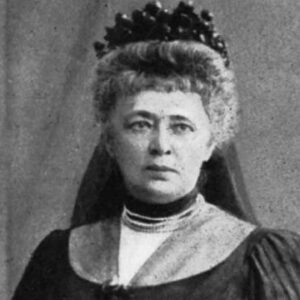Baroness Bertha Felicie is a character in the film Bertha Felicie Sophie von Suttner, a Czech-Austrian pacifist, was the first woman to be awarded the Nobel Peace Prize for her efforts to promote peace. She also wrote the world’s most famous book on anti-war feelings, which was published in many editions and was translated into all European languages. The book sent a message to all warring nations, urging them to lay down their weapons and resolve their differences via discussion. Her ‘generalissimo of the peace movement’ moniker was earned by her publications, speeches, and attendance at numerous gatherings and meetings. Despite being born into aristocracy, she struggled financially throughout her life. She was denied admittance into the upper echelon of society due to her mixed ancestry and lack of wealth or huge properties to talk about. She was a writer, a language instructor, and a peace campaigner. During her time with her mother and then with her husband, Sutner’s life was beset by financial difficulties.
Childhood and Adolescence
Bertha von Suttner was born on June 9, 1843, in Prague, Czechoslovakia, as Countess Kinsky.
Franz de Paula Josef Graf Kinsky von Wchinitz und Tettau was a field marshal when she was born. Sophie Wilhelmine von Korner, her mother, was the daughter of a cavalry captain. Arthur, her older brother, was her only sibling.
She aspired to be an opera singer since she was a child, therefore she studied music extensively. She also took private lessons in a variety of languages from a variety of tutors.
Career of Bertha von Suttner
In 1873, she moved to Vienna to look after the Suttner family’s four daughters. She met her future husband here.
In 1876, she moved to Paris to work as Alfred Nobel’s secretary.
She returned to Vienna to marry Baron Arthur Gundaccar von Suttner after a brief stint as Alfred Noble’s secretary. Bertha von Suttner had to leave Vienna and travel to Mingrelia in the Caucasus since the Suttner family did not approve of the match.
During their time in the Caucasus, she and her husband taught languages and music to make a living. She published four novels and a book called ‘Inventarium der Seele,’ a poetic depiction of her life with her husband.
She and her husband relocated to Tblisi in 1882.
After Arthur’s family approved their marriage, she and her husband returned to Vienna in 1885.
Her next work, ‘Das Maschinenzeitalter,’ or the ‘Machine Age,’ was released in 1889 and was influenced by Spencer and Darwin’s ideas.
She released a book called ‘Die Waffen nieder,’ or ‘Lay Down Your Arms,’ in late 1889, which piqued the interest of many peace-loving people.
In 1891, she founded a peace group in Venice and later became the President of the ‘Austrian Peace Society.’ She was the first woman to attend an international peace conference, and she founded the ‘Bern Peace Bureau.’
She maintained in touch with Alfred Nobel and vowed to keep him informed on the progress of the peace movements.
She co-founded the peace periodical ‘Die Waffen Nieder’ with A.H. Fried in 1892 and served as its editor until 1899.
She received a letter from Alfred Nobel in January 1893 regarding the establishment of a peace prize.
She and her husband set about organizing gatherings and giving talks in order to gain support for the upcoming 1899 Peace Conference.
Despite her grief following the death of her husband in 1902, she continued to lecture and write, traveling only when absolutely necessary.
In 1904, Suttner attended the Boston International Peace Conference.
She continued to labor even after obtaining the Nobel Peace Prize in 1905. She was a founding member of the Anglo-German Friendship Committee and lectured on various nations’ military engagement in other countries.
At the Hague Conference in 1907 and the London Peace Conference in 1908, she provided interviews to the ‘International Club.’
She was inducted into the ‘Carnegie Peace Foundation’ in 1911.
Despite being critically unwell, she spoke at the Hague International Peace Conference in 1913.
She worked on preparations for the International Peace Conference in Vienna in September 1914 throughout the year but was unable to do so since she died in June 1914. The First World War came out two months later, confirming all of her prophecies.
Major Projects of Bertha von Suttner
‘Inventarium der Seele,’ her first serious novel, chronicled her experiences with her husband.
In 1889, she published her second book, ‘Das Maschinenzeitalter,’ which was critical of nations arming themselves for war.
Her third novel, ‘Die Waffen Nieder,’ was a huge hit with peace activists, and it was published in 37 versions and 12 languages.
Achievements & Awards
Bertha von Suttner was awarded the Nobel Peace Prize in 1905 for her efforts to promote peace to the world on a global scale.
Personal History and Legacy
She married Arthur Gundaccar in secret because Arthur’s family did not approve of the union.
Bertha von Suttner died of cancer in Vienna, Austria, on June 21, 1914.
Humanitarian Service
She fought tirelessly to persuade the world that progress could only be achieved through peace and harmony.
Estimated net worth
The estimated net worth of Bertha von Suttner is unknown.
Trivia
Bertha von Suttner was unable to pursue a career as an opera singer due to her inability to overcome stage fright.


